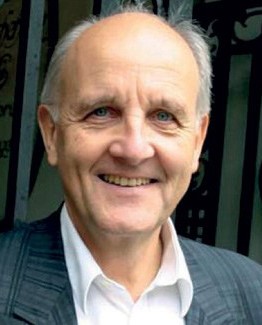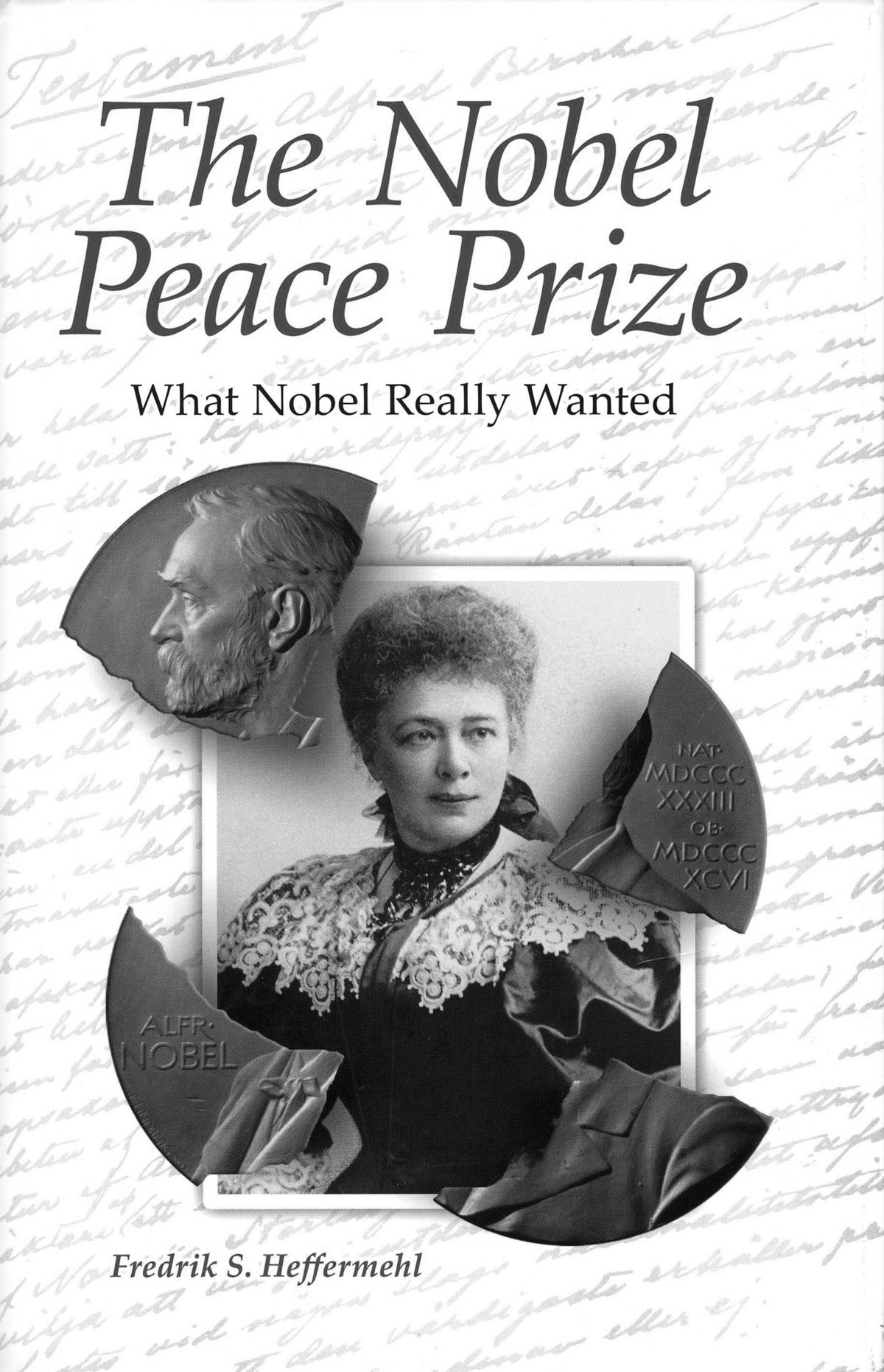Nobel Peace Prize Committee joins in the new Cold War
2021 awards raise many questions
by Karl-Jürgen Müller
It is exactly 10 years since Dieter Deiseroth, former judge at the German Bundesverwaltungsgericht (Federal Administrative Court) summarised the criticism of the Norwegian lawyer Fredrik S. Heffermehl of the awarding of various Nobel Peace Prizes in an article for the German journal Blätter für deutsche und internationale Politik (10/2011)1. Deiseroth, who was an honorary scientific advisor to the International Association of Lawyers against Nuclear Arms (IALANA) and the International Physicians for the Prevention of Nuclear War (IPPNW), died in 2019. Heffermehl has also had his say in Current Concerns2 and published the first edition of his book, “The Nobel Peace Prize. What Nobel Really Wanted”, in 2008, which has since been translated into several languages. In it, Heffermehl explained that the Norwegian Nobel Committee, which is made up of politicians, continuously disregards the criteria for awarding the Nobel Peace Prize as laid down in Alfred Nobel’s will of 1895.
Alfred Nobel’s conditions for the award of the Nobel Peace Prize
Nobel had stipulated that the prize should be awarded annually “to the person who has worked most or best towards the fraternisation of nations and the abolition or reduction of standing armies and the holding or promotion of peace congresses”. According to these standards, Fredrik S. Heffermehl found in 2008, at least 51 of the 121 Nobel Peace Prizes awarded up to that time were unjustified.
Norwegian Nobel Committee – “Blind loyalty to NATO”?
Heffermehl’s answer to the question of the reasons for this was summarised by Dieter Deiseroth: “The author sees the reasons for the negative development of recent decades primarily in the failure of the Norwegian Parliament. Since 1948 it has divided the five seats of the Nobel Committee according to proportional party representation. The special qualification, skill and experience, which are relevant for the assessment of the allocation criteria, did virtually not play any role for the selection of committee members. Only the basic consensus on Norwegian security policy that had evolved since the beginning of the Cold War in the late 1940s had to be observed. For the members of the committee compliance with Norwegian foreign policy – and consequently concepts of military strength and an almost blind loyalty to NATO – were more important than respect for Alfred Nobel’s testament.” (emphasis km)
Yet today actual peace policy is so extraordinarily important
The Nobel Peace Prize is considered the most important annual award for peace policy action. In fact, such action is urgently needed in the current world situation. It is no longer only regionally limited conflicts and wars that require a peace policy response; the world is in the midst of an escalating global conflict and confrontation situation; many are speaking of a new global Cold War. In our Western media, we can daily see how the enemy image of Russia and China is being shaped like in a campaign, and this matches with actual foreign and military policy decisions. The world is arming itself in many ways, not least in propaganda, and is moving further and further away from the goal of peace. In particular, the USA and its allies are finding it very difficult to accept that they have to give up the hegemonic position they established after 1990 (keywords: “new world order”, neoliberal globalism, “global governance” with “rules-based order”) – in favour of equal rights for all states and in favour of the right of peoples to self-determination, as the United Nations Charter dictates. In the back and forth between the great powers USA, China and Russia, it is not always easy to see what exactly is happening. This makes it even more important to look at cause and effect.
Questionable awarding of the 2021 prize
This year’s awarding of the Nobel Peace Prize on 8 October to the Russian journalist Dmitry Muratov and the Philippine journalist Maria Ressa is clearly not a contribution to peacebuilding and once again does not comply with the guidelines Alfred Nobel laid down in his will. In particular, the awarding of the prize to the Russian journalist is quite obviously another piece in the mosaic of the new Cold War.
This judgement is not pertaining to the quality of the journalistic work of the two prize winners. This should not and cannot be judged here. Following the press release of the Nobel Prize Committee, the journalistic work of both laureates is concentrating on a sharp criticism of the internal conditions in their countries. Muratov had “defended freedom of expression in Russia for decades under increasingly difficult conditions”. His newspaper is the “most independent newspaper in Russia today, with a fundamentally critical attitude towards power”. The paper offers “fact-based journalism and professional integrity”. All this cannot be verified here, and the question may be asked why and to what end the Nobel Committee, which cannot carry out scientific research in Russia, is so certain in its judgement and who its “witnesses” are.
The Russian government itself has commented through the president’s press spokesman, Dmitry Peskov. He stated Muratov was courageous and talented: “We can congratulate Muratov, he works consistently according to his ideals. He stands up for his ideals.” Howsoever one may classify these statements, they earned sharp criticism in the West. The “Frankfurter Rundschau” wrote on 8 October: “A gesture that can hardly be surpassed in cynicism.” Such judgements are also formulated very quickly and are more in keeping with the new Cold War.
Euphoric reactions from the West
In general, the reactions of Western media, journalists’ associations and politicians to this year’s award ceremony were downright euphoric. The purpose is immediately obvious. For example, a headline in Zeit-Online on 8 October reads: “Writing against Putin and Duterte”. And in another article: “The Nobel Peace Prize for two journalists is perhaps the most political act of the Nobel Committee in a long time. This award intervenes in an open field battle between authoritarian rulers and civil societies, between systematic repression and defiant disclosure of what is really going on in the world.” Or the “Frankfurter Rundschau” of the same day: “For the autocrats Putin and Duterte, the awarding of the Nobel Peace Prize 2021 is an open humiliation.” The prizes had been awarded to “two journalists who loudly and audibly fight for freedom of the press, denounce oppression in their countries and risk life and limb to do so”. The Nobel Committee had thus sent a “great signal”.
As expected, US President Joe Biden also spoke out: “Ressa, Muratov, and journalists like them all around the world are on the front lines of a global battle for the very idea of the truth.”3 The question arises, however, how this commitment to truth compares with the US treatment of whistle-blowers and journalists like Edward Snowden, Chelsea Manning, Daniel Hale or Julian Assange.
Alfred Nobel ignored again
What Alfred Nobel really wanted to achieve with his prize is almost nowhere addressed, neither by politicians nor by the media. The Nobel Committee has tried to construct connections by saying that freedom of expression is “a prerequisite for democracy and lasting peace”. And in the last paragraph of its press release, the committee even made an explicit effort to explain in two sentences that this year’s awarding of the prize was entirely in the spirit of Alfred Nobel. However, one must have considerable doubts about this – when looking at the facts, especially the handling of this award by Western politicians and media. If one adds to this the state of freedom of expression in many Western countries, the term “double standards” comes to mind again, one could also say: hypocrisy.
Where are the personalities who stand up for peace?
At the end of this article there should be a quotation from the German Nachdenkseiten, which does credit to the name of this website. It is taken from an article by Albrecht Müller. He is the editor of the Nachdenkseiten website and was a political advisor to the Nobel Peace Prize winner Willy Brandt. On 9 October he wrote: “The Nobel Committee’s decision to award the Nobel Peace Prize to the Russian journalist Muratov shows the misery of our time. It serves to build up an image of Russia as an enemy and to whitewash the situation in the West. The building of the image of the enemy promotes further confrontation and ultimately the danger of a bad military confrontation.”
But where are the personalities who today actually stand up with all their energy and determination for what was – rightly – so extraordinarily important to Alfred Nobel more than 125 years ago? •
1 Also published in Current Concerns No. 27 of 2 July 2012
2 E. g. in Current Concerns No. 31 of 30 July 2012 with a reprint of the final chapter of his book “The Nobel Prize. What Nobel Really Wanted”
3 https://bd.usembassy.gov/statement-by-president-joe-biden-congratulating-nobel-peace-prize-winners/ of 8 October 2021
Good protection of press freedom?
by Fredrik S. Heffermehl, lawyer and writer, Norway

(picture ma)
In 2021, Nobel’s prize once again followed the ideas of its Norwegian awarders. In its editorial, the leading Norwegian daily “Aftenposten” again was delighted: The Committee had “awarded the prize to two people on the front-line fighting for the right to freedom of expression and who do not give up despite pressure and threats”. But were the two winners really first in line?
In all the enthusiasm people should not forget that Nobel created a prize for global disarmament, not a prize for freedom of the press. Also in 2021 the committee could easily have promoted Alfred Nobel’s vision of peace. One of the candidates this year was of utmost relevance to ridding the world of the politically enormously powerful global military order that Nobel wanted the prize to fight. The most acute and deadly threat to press freedom in the world today is the US campaign against Julian Assange.
Australian Assange, founder of WikiLeaks, deserves the thanks of world public opinion for exposing US war crimes in Iraq and Afghanistan. Russian press freedom is, after all, a local problem, but the US attack on Assange is seeking prevent media around the world from reporting critically on US abuses of power and crimes. So far, Assange has been deprived of his health and freedom for ten years. He is being held in isolation as a political prisoner in the Belmarsh maximum security prison in London, without charge or sentence, his treatment is torture. His courageous revelations could soon cost him his life. A Nobel committee faithful to Alfred Nobel’s vision of peace could have protected Assange from an egregious rights violation through extradition and life imprisonment in the United States.
And now the great paradox: Fortunately for the Nobel Committee, the freedom of the press it praises so highly does not work. If it had worked in matters of (unchecked) militarism, the world would no longer continue believing that Nobel established the prize for anything that could be labelled “peace”, the media would long ago have told people that the Norwegian-administered prize had betrayed Nobel’s main idea of global cooperation on disarmament as indispensable to peace. With vigilant media the Nobel Committee could not have got away with its betrayal of the core of the Nobel Prize. My 14 years of trying to explain and defend the Nobel idea have failed because the world media support the powerful military-industrial sector and are unable to see global disarmament as the only realistic means in a world with so many life-threatening problems.
(Translation Current Concerns and Fredrik Heffermehl)
